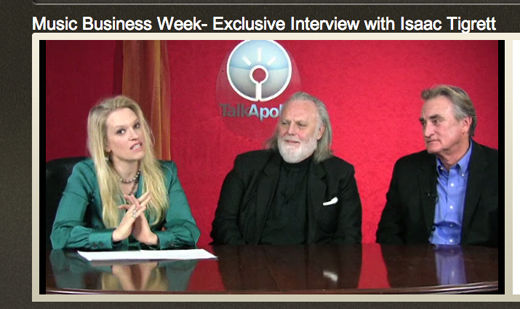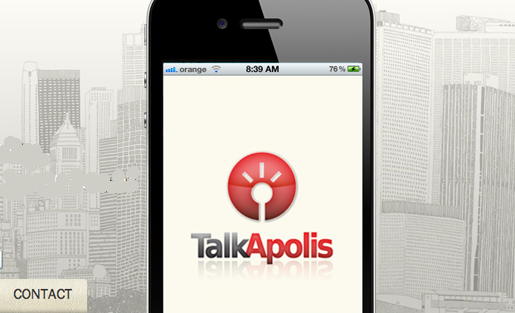What’s the #1 thing wrong with podcasts? They are called “podcasts,” a word that is either meaningless to a large number of people or is associated with an iPod, a device that is not necessary to consume podcasts. The folks at TalkApolis want to change that perception by calling their video/audio podcasts about the Nashville, Tenn., scene “microcasting.” And they have designs on getting beyond Nashville and licensing their technology out to other local startups who want to create their own TalkApolis.

What is microcasting? TalkApolis founder John Bransford told me it’s about focusing on a smaller, targeted audience in one specific location. The startup is trying to take the business model of Leo Laporte’s Twit.tv — targeted netcasts with ads — and bring it to hyper-local news and entertainment. The site launched last April, and has had 13 different shows about everything from fantasy football to the burgeoning East Nashville scene. You can watch video or audio versions of the shows.
Bransford was surprised at the success of the East Nashville show, but sorry that a show on local crime called “Mugshotz“ hadn’t caught on. “You live and learn,” he said. “It was not original thinking. On the web, there are a million mugshot sites. It’s just not unique.”
One show that did catch on was an interview with Isaac Tigrett, the co-founder of Hard Rock Cafe and House of Blues, who unveiled his redevelopment plan for the Tennessee State Fairgrounds on the Music Business Week show.

That show was viewed 16,000+ times in the first week, and the story was picked up by the Tennessean newspaper.
I talked with Bransford via Skype recently, and the following is an edited version of our Q&A, with a few audio clips.
Q&A
You describe TalkApolis as being “microcasting” instead of podcasting. Can you explain what microcasting is?
John Bransford: It’s focused on a relatively smaller audience in a geographic location. In our case it’s pinned to that geographic location, but otherwise it’s not that different. It’s the same form. I think we need a new word for it because podcasting has become stigmatized by not being widely adopted early on. The difference is the smartphone. The thing that took Twit.tv from $200,000 a year in 2008 to $1.5 million in 2009 was the introduction of iOS and Android apps and the smartphone. It changed the game. They have a specific targeted interest group and sub-interest groups, and that’s what we’re doing on the local level.
What does Leo Laporte think about it?
Bransford: We’ve had a few emails back and forth. He thinks it’s great; he gets it. I don’t have to convince him, and he likes it.
Bransford talks about mobile usage and how a mobile ad boom is coming:
You’ve started with microcasts in Nashville. How are people using them, listening to them, watching them?
Bransford: We do have data now … and the Music Business Daily Show we do is mainly listened to, the MP3 version. I think they’re listening to it in their car, walking around the house — wherever they have bandwidth. There’s no real reason they have to watch it. Some of the others are like that.
We experimented with doing a high school playoffs-oriented show for five weeks, and it was very successful — about 5,000 to 10,000 downloads per show, which is pretty good. It was an underserved market.
How do you bring in the audience?
Bransford: It’s all done through Facebook and Twitter. There’s a certain type of person who’s a journalist for the paper or a former anchor for a local TV station. They’ve built a large Twitter following. We have hosts who have 10,000 Twitter followers, 5,000 Facebook followers — with a Facebook fan page and a personal page.
People are spending so much time on their mobile phone, and a lot of that time looking at their Facebook news feed and Twitter feed. When you have hosts who have 10,000 Twitter followers, theoretically that’s a lot of people to place that link and video thumbnail in front of every day from that host. If you start to cross-promote with 10 hosts with 10,000 followers then you reach 100,000. That’s not a big deal on a national scale, but if it’s locally focused it’s about 10 percent of the entire population of Nashville. Obviously there’s going to be overlap — it’s not 100,000 unique people, but it’s a simple matter of math.
So one of your requirements for hosts is that they have a significant following on social media?
Bransford: Absolutely. It’s a requirement that we developed after seeing the success of people who had that. There’s no point in trying to promote it otherwise. When you have multiple hosts cross-promoting — and we require that of them — it helps every show when you add one.
Bransford explains the success of a local show on fantasy football:
So you have no paid promotion of shows?
Bransford: No. Zero. Unless you count the few Facebook ads I was running to get people to like us last summer. We don’t need that now that we made the cover of the Tennessean.
Do you have studios where all the shows are taped?
Bransford: Most of it’s done here. We have two studios here at our headquarters, and we’re lucky to be in Nashville where there’s a lot of production talent. But we still had to work on the studio setup. I think Twit.tv’s main technology is Tricaster, which is Windows-based, and I didn’t want to go that way because all the audio guys here use Mac. So we created our own special version of Tricaster that’s Mac-based with live-switching. It was harder than I thought it would be, but we got it.
Sometimes we have to edit it later, but it’s so time-consuming to do that, so we try not to do it. If it’s really horrible we’ll change it, but it’s rare.
So tell me what’s bombed, what’s failed, and what you learned from that?
Bransford: I don’t think it’s completely failed, but “Mugshotz” fell short. We thought it was a brilliant way to get local bail bondsmen because they operate under the assumption that when someone’s put in jail the only way they they can get the business is if someone remembers them. That makes sense, but it didn’t catch on the way we thought it would. You live and learn. It was not original thinking. On the web, there are a million mugshot sites. It’s just not unique.
Bransford explains how surprised he was by the success of a show about the hip East Nashville scene:
What have you learned about the length of shows?
Bransford: Podtrac monetizes podcasts and I’ve talked to them, and they are big proponents of 45 minutes, mainly because they can get more ads in. I think that’s too long. We’re going with anywhere between 15 minutes and 30 minutes is optimal. But things like this big story on the Fairgrounds, where you have a lot of passion, and it flows, I let them run to 45 minutes. But otherwise, I try keep it under that.
What are ways that people can interact with the shows?
Bransford: Right now, it’s just on Twitter; they’re interacting with the hosts. We’re not doing them live yet. We have the technology for a live-stream, but we’re not doing it. We’re just 6 months old, and we’ll get there eventually. We’re just doing the shows and then uploading them when we’re finished.
Tell me more about your work with the Ford Foundation?
Bransford: They have this iCan initiative, which goes back to a show they co-sponsored on Hulu called “I Can Dream.” That show got cancelled and it didn’t get the traction they wanted … But Ford wants to do it focused on different local areas. They’re trying to teach high school students. The Hulu show followed students in a reality show style, which can tedious. They want to do it in Nashville and were looking for a platform … It looks like they will use us as a test. They want to get to young people who have smartphones. So their plan is to then take it around the country. It’s about a 90 percent chance of happening.
How did you get funding to start?
Bransford: It was very much friends and family. We are now in the process of talking to Microventures, one of those crowdfunding deals, and some other sources for a second round of funding. And hopefully at Google Ventures, plus we’ve had some interest locally.
One of your plans is take this model from Nashville to other cities. How would that work?
Bransford: Think of this like franchising. I don’t like using that exact word, but it’s similar. It’s a licensing model. We have a Drupal CMS; it’s multi-site capable. I have people who are good with cloud computing and server management and have a good hosting company in Dallas. We will manage everything for them; they’ll have their own site but won’t have to worry about day-to-day server problems which can eat up your time. You don’t have to be good at tech to understand this business model; you have to be good at local ad sales.
*****
What do you think about TalkApolis and the idea of microcasting to a hyper-local community? Do you think it will succeed in taking it beyond Nashville? Share your thoughts in the comments.
Mark Glaser is executive editor of MediaShift and Idea Lab. He also writes the bi-weekly OPA Intelligence Report email newsletter for the Online Publishers Association. He lives in San Francisco with his son Julian and fiancee Renee. You can follow him on Twitter @mediatwit. and Circle him on Google+


John Bransford is a scam artist. I would not recommend doing business with him or Talkapolis. He has a terrible reputation in the industry. Stay away.